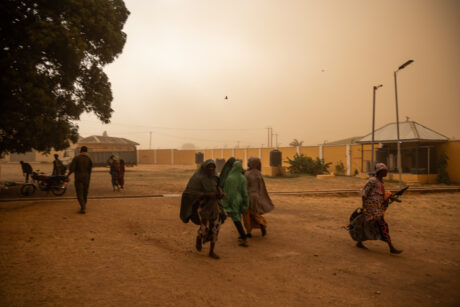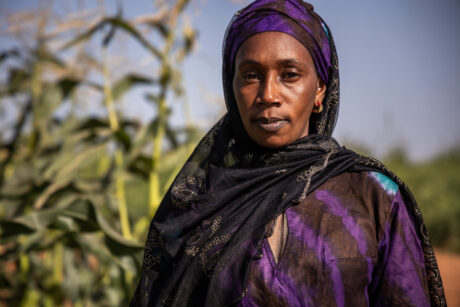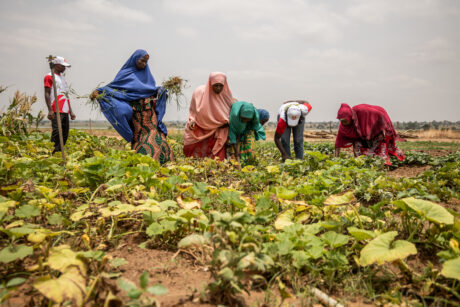Un componente esencial de los EE. UU.. La estrategia del gobierno para fortalecer su relación con África es estimular el comercio bidireccional y la inversión para fomentar el crecimiento económico de acuerdo con el África próspera iniciativa. A pesar de considerable Retrocedentes económicos causados por la pandemia global, África presenta un inmenso potencial económico con su rápido crecimiento, tanto en términos de su población como de oportunidades comerciales.
En el marco del programa financiado por USAID Comercio de África Occidental & Centro de inversión, Hemos tenido la suerte de interactuar directamente con los dueños de negocios., líderes financieros, funcionarios gubernamentales y otras partes interesadas durante el pasado 16 Meses de la implementación de la iniciativa. Basado en nuestras discusiones y observaciones generales del sector privado en África occidental, Esperamos que estas cuatro tendencias dan forma a las relaciones con el comercio y la inversión de los Estados Unidos y África en los próximos meses.
AFCFTA establecerá el tono para las relaciones comerciales
El Área de libre comercio continental africano (AFCFTA) es la área de libre comercio más grande del mundo basada en la cantidad de países que participan. Se predice que tiene un efecto sustancial en las economías africanas y la relación entre África y el resto del mundo., incluyendo los estados unidos. Desde que entró en vigor en Jan. 1, Es demasiado pronto para declarar la medida en que AFCFTA afectará el comercio e inversión estadounidense a África. Sin embargo, Se espera que genere beneficios considerables y establezca el tono para las relaciones comerciales y de inversión..
Afcfta cubre una población de 1.3 mil millones de personas en todo 54 países, representando un mercado de mercado $3.4 billones en el PIB. Además de tener el potencial de sacar a millones de la pobreza, La promesa de un comercio regional mejorado tiene el potencial de expandir significativamente el mercado para los productores locales y, en algunos casos, hacer que las empresas sean más atractivas para la inversión extranjera directa.
Este acuerdo de libre comercio también crea un vasto mercado para bienes y servicios de los Estados Unidos.. Con los nuevos EE. UU.. Administración inclinada para centrarse en el multilateralismo en África, Se espera que se anuncien nuevas iniciativas que aceleran y simplifican el comercio y la inversión bidireccional. Algunas de estas iniciativas serán impulsadas por el enorme potencial de AFCFTA.
Aumento de los EE. UU.. inversiones en el sector privado de África
Inevitablemente, Covid-19 dirigirá las economías del mundo en 2021. Esperamos que algunas de las tendencias macroeconómicas predominantes del año pasado continúen, aunque mitigado en comparación con la altura de la pandemia en 2020.
En África, Las interrupciones a las cadenas de suministro permanecerán, Problemas de flujo de efectivo en aumento para los productores, proveedores y exportadores. Desafortunadamente, Esto conducirá a redundancias, pérdidas de empleos y fallas comerciales a medida que el acceso a las finanzas se vuelve más costoso y más difícil de encontrar. Por otro lado, Las oportunidades de inversión aumentarán debido a estos mismos problemas de flujo de efectivo. Esta situación podría acelerar el flujo de inversiones extranjeras directas en África.
El centro comercial, por ejemplo, está facilitando la reunión de inversores y empresas locales para avanzar en la resiliencia CoVID-19 al proporcionar fondos catalíticos para eliminar el riesgo y alentar tales inversiones. Nosotros anunciado Algunas de estas ofertas catalíticas, y más están en la tubería. Vale millones de dólares, Estas coinversiones están diseñadas para impulsar y atraer aún más inversiones en África occidental durante estos tiempos difíciles..
Asimismo, el A NOSOTROS. Iniciativa Prosper de África del Gobierno ha aprovechado los servicios y recursos de 17 agencias participantes para impulsar miles de millones de dólares de inversión en África. En apoyo de Prosper Africa, USAID está lanzando un $500 millones de programas comerciales e de inversión para facilitar más acuerdos entre los EE. UU.. y empresas africanas y para abordar las barreras comerciales y de inversión. Tales EE. UU.. Las iniciativas impulsadas por el gobierno en toda África garantizan que las inversiones extranjeras directas aumentarán este año para impulsar la resiliencia e impulsar el crecimiento en la región.
Más PYME africanas exportarán a los Estados Unidos
El Ley de Oportunidades y Crecimiento Africano (AGOA) otorga a los países africanos una ventaja competitiva al permitir exportaciones libres de impuestos para casi 7,000 Productos de África a los Estados Unidos. Ha creado a largo plazo, Crecimiento sostenible mediante la estimulación del sector privado y creando empleos en muchos países africanos. También ha apoyado el crecimiento de ciertos sectores en la región, como la fabricación de prendas.
En 2020, acerca de $3.72 mil millones El valor de los bienes exportados de África a los Estados Unidos se facilitó a partir de Ago. Existe la oportunidad de aumentar este valor, Dado los EE. UU.. El mercado de consumo consiste en más de 328 millones de personas con poder adquisitivo de $13 billón.
Sin embargo, Uno de los mayores desafíos del centro comercial en sus esfuerzos por promover un aumento del comercio es encontrar productores listos para la exportación..
Para abordar la escasez de posibles exportadores, El equipo de promoción de exportaciones del centro comercial ha trabajado con una docena de pequeñas y medianas empresas (Pymes) para ayudarlos a preparar la exportación. Las pymes crean alrededor 80 porcentaje del empleo de África. Al proporcionarles asistencia técnica sobre temas que van desde la obtención de la certificación hasta los productos de empaque, El centro comercial tiene como objetivo impulsar su potencial de crecimiento. Esto ha generado mucho interés en los diferentes sectores en el ecosistema comercial de África occidental.. Esperamos 20 a 40 Las PYME en África occidental se beneficiarán de estos programas de promoción de exportaciones y que más empresas se unirán a la iniciativa una vez que vean que sus homólogos tengan éxito en ampliar gracias a la asistencia de exportación de Agoa.
Aumento de actividades en el clima, seguridad alimentaria, y digitalización
Aunque los precios globales de los alimentos han sido estables, La inflación alimentaria ha aumentado a nivel minorista en muchos países Debido a las interrupciones de la cadena de suministro causadas por Covid-19. El aumento de los precios de los alimentos tiene un mayor impacto en los países africanos de bajos ingresos porque las personas gastan una mayor parte de sus ingresos en los alimentos.. Al mismo tiempo, Muchas familias están lidiando con ganancias perdidas o reducidas. Aparte de los desafíos inducidos por la pandemia, El cambio climático amenaza la producción de alimentos., particularmente para los agricultores de subsistencia, que forman una gran parte de la población en la mayor parte del África subsahariana.
Con un nuevo EE.UU.. postura sobre el clima, Se prevé que las relaciones comerciales y de inversión entre Estados Unidos y África contarán cada vez más con soluciones climáticamente inteligentes., especialmente aquellos que abordan los desafíos de la seguridad alimentaria y proporcionan energía limpia para mejorar el acceso a la electricidad., que muchos africanos todavía carecen.
En general, La digitalización es la piedra angular para resolver los problemas de acceso en todos los ámbitos., De facilitar el comercio regional a acabar con el hambre. aparte del acceso, Es un sector altamente productivo con potencial para crear empleos a escala., especialmente para los jóvenes. Las inversiones privadas de los Estados Unidos al sector de tecnología digital de África ya son significativas, Por lo tanto, esperamos que esta tendencia continúe a medida que la participación del gobierno aumenta en este sector habilitador.
El impacto de estas tendencias dependerá de muchos factores. Cualquiera que sea el caso, Las relaciones comerciales y de inversión bidireccionales entre Estados Unidos y África se están perforando para mejores tiempos.
Michael Clements es el jefe de fiesta del comercio de África Occidental financiado por USAID & Centro de inversión. Tiene experiencia en la industria diversa, incluso en la agricultura, energía, tecnologías de la información, fabricación, y minería. Antes de unirse al centro comercial, Michael dirigió dos fondos de desarrollo de inversiones para la marca registrada de África Oriental.
El contenido de este artículo es responsabilidad exclusiva de Creative Associates International y no reflejan necesariamente las opiniones de USAID, Estados Unidos. El gobierno o sus programas como Prosper Africa. Fotos proporcionadas por Wacot Rice Ltd., Un concesionario del centro comercial en Nigeria.



